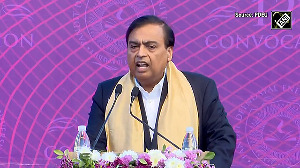In a new twist to the gas dispute between Ambani brothers, the fertiliser ministry on Monday said private family agreements cannot over-ride national priorities.
Urea plants had been given the first priority in sale of natural gas from Reliance Industries' D6 but the Bombay high court had upheld the Ambani family, giving 70 per cent of the initial volumes from the fields to Anil Ambani Group's RNRL.
"The gas in question has been allocated (to fertiliser, power and other sectors) based on the government's authority and rights under the Production Sharing Contract (for D6) aimed at regulating gas marketing and allowing their orderly growth," fertiliser secretary Atul Chaturvedi wrote to his counterpart in the petroleum ministry, R S Pandey, on June 24.
"Our understanding is that any family settlement would not over-ride the sovereign right of the government to formulate policies aimed at larger public interest," he wrote. When contacted, Pandey acknowledged receipt of the letter and said, "They have raised an issue which will need to be examined."
"In this context, implications of the judgement will have to be legally examined," he said.
Twelve urea manufacturing companies were allocated 14.97 million cubic meters per day when the government prioritised sale of the initial 40 mmcmd from D6 primarily between fertiliser and power companies based on national priority of food security and meeting energy deficit.
But the Bombay High Court on June 15 ruled that RIL should honour its commitment in the family split agreement and supply 28 mmcmd gas to RNRL.
"If such a private arrangement has implications on already signed Gas Sales and Purchase Agreements for the allocated gas and if the existing rights of fertiliser companies are altered to their disadvantage, I am afraid they may also seek available legal remedies independently," Chaturvedi wrote.
He sought a re-confirmation from the petroleum ministry that "existing gas allocation, its price and GSPAs would remain intact."
The fertiliser industry, he said, had sought a re-confirmation to the effect that the recent Bombay High Court judgement would have no implications on the supply of gas from KG basin.
"The clarification/re-confirmation in this regard will remove the uncertainty in supply of feedstock to the fertiliser industry.
"This would also have implications on the fuel oil and naphtha based urea units, which are making large investments to switch feedstock to natural gas as per the declared policy of the government," he wrote.
Chaturvedi said the fertiliser industry was allocated about 15 mmcmd of gas from D6 as first priority under the Gas Priority Utilisation Policy of the government.
Pandey said the Fertiliser Secretary had sought a reconfirmation of gas supplies to urea plants in context of the Bombay high court judgement. "Implications of the judgement (on supplies) will have to be examined."
The Bombay high court had said that the terms of supply to RNRL would be based on RIL's bid for a 2004 NTPC tender.
The price in NTPC tender was $2.34 per million British thermal unit, 44 per cent lower than government-approved rates of $4.20 per mmBtu.
The Bombay high court on June 15 gave RIL and RNRL a month's time to work out firm gas volumes, price, timelines and other commercial details for sourcing the fuel from Krishna-Godavari basin fields.
RIL can currently produce 37 mmcmd of gas per day from D6 fields but was producing only 28 mmcmd as some power and fertiliser companies are not taking their allotted quantities.
In the MoU that split Dhirubhai Ambani's business empire, the Mukesh Ambani-run firm had committed to supply 28 mmcmd to power plants of the group run by his younger brother for 17 years.
Mukesh had got petrochemicals, refining and the oil and gas business while the power plants, telecommunications and the financial services business had gone to Anil in the split.
The price in the MoU was the same as the one RIL had bid for in a 2004 NTPC tender.
RIL had bid to supply 12 mmscmd gas to NTPC at $2.34 per mmBtu but a Gas Sales and Purchase Agreement could not be signed because of dispute between the two over clauses like liability in the case of default. NTPC has dragged RIL to the Bombay high court seeking performance of the bid in a separate case.






 © 2025
© 2025